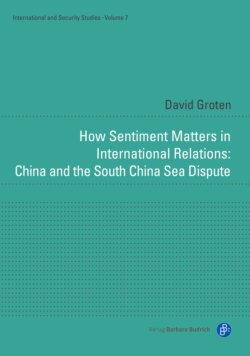Читать книгу How Sentiment Matters in International Relations: China and the South China Sea Dispute - David Groten - Страница 20
На сайте Литреса книга снята с продажи.
2.2.1 Hypothesis I: ‘China’s self-ascribed status and identity conceptions were subject to change between 2007 and 2016’
Оглавление“China’s unique view of itself and its place in the region heavily colours the perceptions and expectations that shape PRC policies“ (Roy, 2013, p. 2).
Focusing on the self-evaluative dimension of Chinese self-perception, Hypothesis I investigates as to whether a change in self-ascribed status and national identity conceptions can be observed in the time period between 2007 and 2016 and as to whether these conceptions correspond to China’s SCS [44] policy. Accordingly, status is regarded as the relative rank China (and Chinese scholars) believes it occupies in the regional and global context. As such, its status is the result of a social transaction as it does not simply derive from China’s capacities and capabilities but requires social recognition by others47. Similarly, identities are not generated from within and by every actor itself but are negotiated through ongoing dialogue with other actors (Taylor, 1991; White, 1992) instead and produced in differentiation from some kind of ‘otherness’ or ‘out-group’. Hence, identity conceptions are subjective, discursively constructed and, as a relational term, also require a certain degree of social recognition and interaction. In defining how a country (significant domestic groups) perceives itself, the term national identity refers, as a special version of conventional identity48, to the collective level assuming a collective and national dimension. As such, for the purpose of this project, national identity shall be understood as a “collective narrative of the nation” (Hall, 1996, p. 613) and its characteristics and peculiarities. While there is no such thing as a uniform and stable national identity, several of them, just like status conceptions, may overlap, coexist, and replace one another over time. In the view of Wodak, “the discursive construction of national identity revolves around the three temporal axes of the past, the present and the future” (1998, p. 26). In this vein, Hypothesis I argues that a shift in both, predominant status and identity conceptions, can be observed in Chinese elite discourses over time. Accordingly, if such a shift was indeed being observed, it would be expected to have a significant effect on the scope of China’s self-evaluative needs and expectations, and, ultimately, on its policy preferences pertaining to the South China Sea dispute. The two questions guiding the discussion of Hypothesis I read as follows:
- Can a (relative) shift in discursive patterns of self-ascribed predominant status and identity conceptions be observed over time (2007–2016)?.
- Are there any indications that such a shift in status and identity is associated with a change in self-confidence, self-evaluative needs and interests?49
[45] In doing so, Hypothesis I solely addresses the ego or input dimension of Chinese self-ascribed status and identity conceptions. Subsequent chapters, then, will refer back to this dimension, particularly when discussing a possible connection between shifting identity and status conceptions and their effect on China’s respect expectations (output dimension) and, ultimately, policy preferences.
